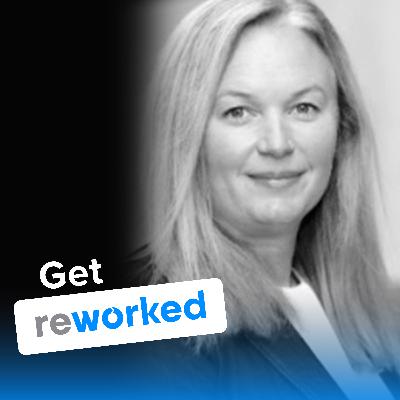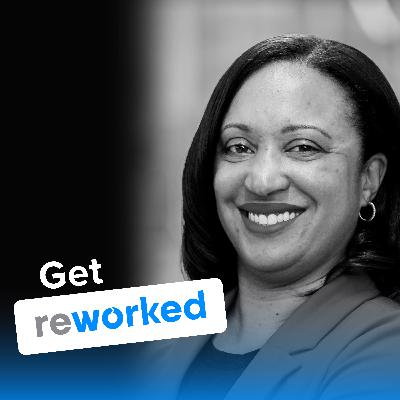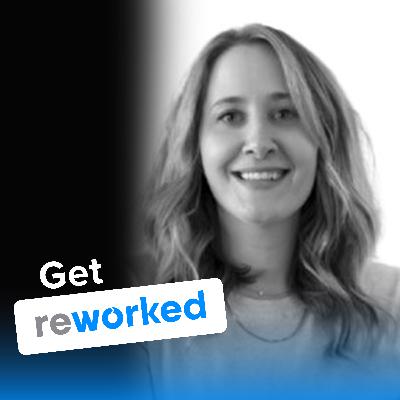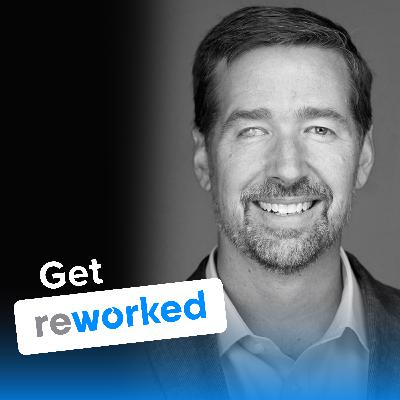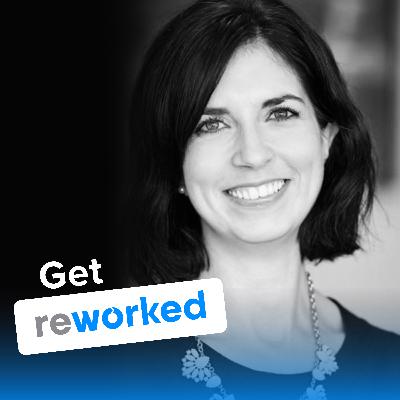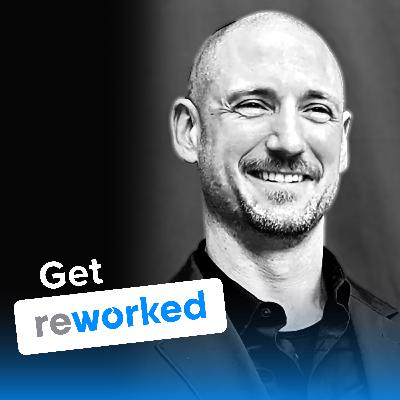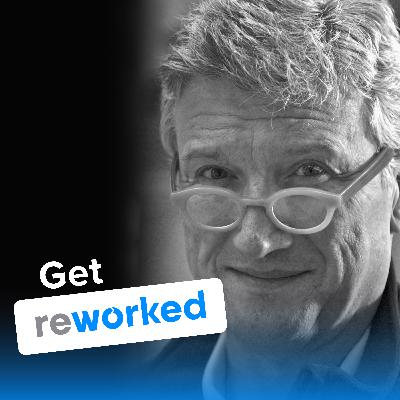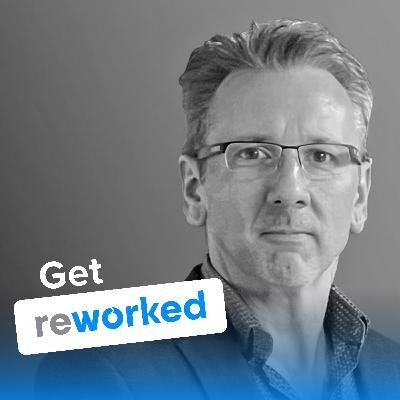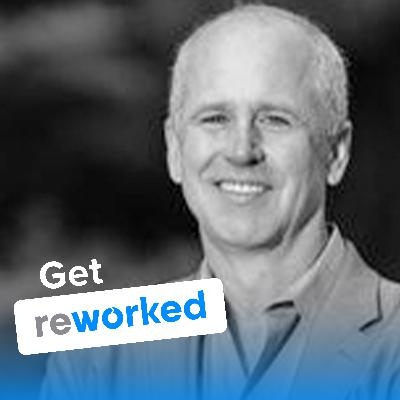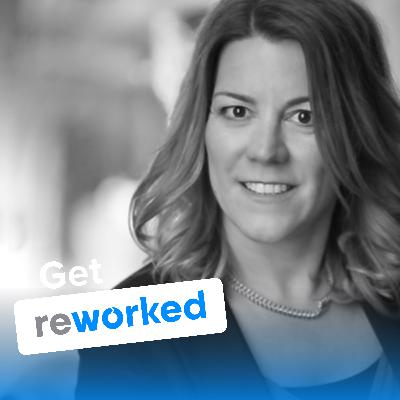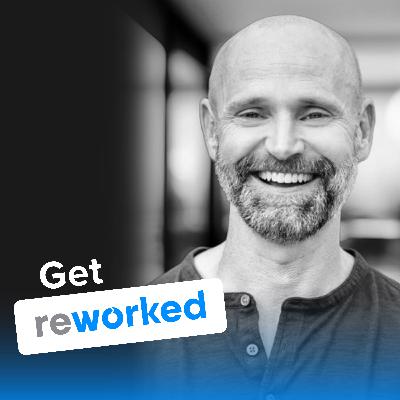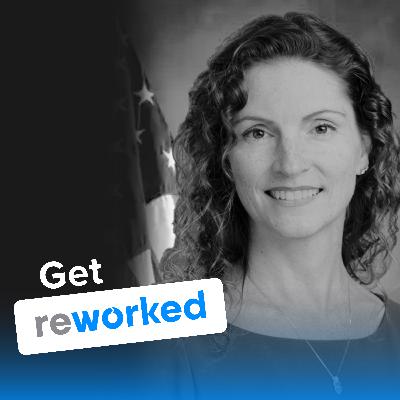Discover Get Reworked
Get Reworked

Get Reworked
Author: Siobhan Fagan
Subscribed: 7Played: 211Subscribe
Share
Description
Forget the status quo — Get Reworked. Join the editors of Reworked, your guide to the r/evolution of work, as they interview business leaders transforming the way work gets done today.
Have a question, comment, idea or guest suggestion? Drop us a line at editors@simplermedia.com.
Have a question, comment, idea or guest suggestion? Drop us a line at editors@simplermedia.com.
73 Episodes
Reverse
Innovation is a word that's often used but rarely understood. But research out of the Upwork Research Institute sheds light on what innovative companies have in common. Upwork Research Institute's Kelly Monahan joins Get Reworked to discuss her research into how innovative companies approach hiring, AI use and distributed work as a cohesive business operating model — and why that helps them deliver change under tight budget restrictions. "The three things we all need in a job is we need autonomy, we need to feel like we're learning and mastering, and we also need to feel connected to community. And those three things I think are in really rare regard today for the ways we think about innovation. I would rather ask, well, do you have autonomy? Do you feel connected to your colleagues? Do you feel like you're contributing to something bigger than yourself than necessarily perks? Again, in a perfect world, you'd have both firing on all cylinders, but I think we overlook at the intrinsic side," said Kelly. Highlights of the conversation include: How workplace innovators maintain culture across a blended organization. Why Kelly doesn't see innovation and efficiency as being at odds. How self-determination theory applies to workplace motivation and satisfaction.
The more technology changes, the more things stay the same. That's one takeaway from my conversation with Northern Trust Asset Servicing's Shaelyn Otikor-Miller. She joins Get Reworked to discuss the journey the company went on to launch Dynamics Copilot and how closely — as big a change AI may be — the rollout resembles previous technology launches. "It does make you question what's the next phase we're about to go through? What's the next corner we're painting ourselves into? What I'm noticing is that there's a lot of passion and concerns around AI and where all the technology is going. I think we just need to slow down the mindset a bit and realize it's just another phase. It's another part of the journey," said Shaelyn. Highlights of the conversation include: The hurdles Shaelyn's team tackled to prepare for the Dynamics Copilot rollout. How they handles the change management side of the rollout. An overview of how 25+ years of technological changes have changed the workplace — and what things stay the same.
Our online tools facilitate learning new practices and exchanging information at the same time they interrupt our focus and fracture our attention. Finding that balance is a motivation for Laura Pike Seeley, knowledge program leader at global architecture firm HKS, Inc. She joins Get Reworked to discuss how the firm strikes that balance through a blend of knowledge sharing practices and approaches. "Digital workplace design is critical here, right? Most of us spend an enormous part of our day working within the digital workplace and the tools that it connects us to. So this environment can be full of flashing lights and distractions, or it can be an environment that guides you through the noise to find the connections and the ideas that matter most to you," said Laura. Highlights of the conversation include: How HKS Inc balances live knowledge sharing lessons and static knowledge hubs to account for employee needs. The differences between knowledge management practices in a consumer packaged goods firm vs. an architecture firm. How she finds the balance between information overload and open exploration and knowledge sharing.
For anyone who's ever had an application reboot in the middle of a meeting, who waited days before they received access to a business critical application, whose computer shuts down whenever they try to upload software — this episode is for you. Frank McAloon, VP of digital workplace and security delivery at CVS Health joins Get Reworked to discuss the cross-departmental coalition he built to improve the digital employee experience for their 300,000 colleagues. By moving these IT tasks under a bigger umbrella of leaders, he's connecting IT efforts to business results and speeding time to resolution. "Overall, the success that we're trying to have with the XMO is to reduce stress on our colleagues, making them more productive, making sure they are more streamlined in what they're doing and ultimately helping our clients and customers across everyone that works with CVS. The happier our colleagues can be and the more efficient they can be, the better it is for everyone," said Frank. Highlights of the conversation include: How he and the XMO office approach prioritization in an organization with more than 300,000 employees. How CVS Health is using AI to identify potential problem areas for colleagues. Why Frank sees a future where IT help desks are no longer needed.
Seven years. That's how long BlackRock spent bringing its new global headquarters from vision to life. In this episode of Get Reworked, Jen Schettino, head of digital workplace and control at BlackRock, shares the seven year journey the company undertook to reinvent not only its physical headquarters, but its digital. The team persevered through the pandemic and other setbacks to bring the headquarters to life in 2022 — which resulted in their recognition as a Reworked Impact Award winner for innovative use of workplace technology. "Change management was the key to our success and really helping people to understand before they ever stepped foot in that building what they were getting, I think really helped us in the weeks and months that followed. And that has been a huge lesson for us as we think about other technologies we roll out, as we tackle other moves like this," said Jen. Highlights of the conversation include: A discussion of the before and after of BlackRock's workplace. Why Jen credits change management for the success of the initiative. The employee response to the new face of BlackRock.
If someone asked you to define design thinking, would you be able to do it? In this episode of Get Reworked, Andrew Lindsay, global head of enterprise design at KraftHeinz, discusses why that lack of a clear definition is in part why design thinking has been called into question and advocates for why it's more important than ever. "In the absence of a design practice and design strategist and user researchers, engineers and product teams and business stakeholders are the hippo — the highest paid person's opinion — who drive those types of decisions. And so having that third-party perspective, that nonpartisan view coming from the design team really helps the teams take a step back, lead with data and insights, and then make more informed decisions," Andrew said. Highlights of the conversation include: What critics of design thinking got right and where they missed the mark. Why Andrew views design thinking is one form of business development. What goes into choosing which problem to solve when with design thinking. Have a suggestion, comment or topic for a future episode? Drop us a line at editors@reworked.co.
Compassion isn't typically a focus of board-room discussions, but maybe it should be. In this episode of Get Reworked, Dr. James Doty, neurosurgeon, author, founder of the Center of Compassion and Altruism Research at Stanford University and founder of Happi.ai joins me to discuss the research behind the creation of his mental health avatar and why companies should learn the science behind why compassion in the workplace pays off for everyone. Listen: Get Reworked Full Episode List "The reality is that there are many corporations which are functioning on an old paradigm, which is motivation through fear. And when that is the paradigm, it leads to several negative aspects. One is it decreases productivity, it decreases creativity, it increases healthcare costs, and it has a negative effect or increases, if you will, human resource costs. So if the corporate entity in and of itself is not a compassionate place, that will dramatically increase problems related to mental health issues," said Jim. Highlights of the conversation include: Why an identified need for self-compassion in part drove the creation of Happi.ai, a mental health avatar. The scientific and financial argument for why compassion matters in the workplace. How technology can both help and harm our efforts to build connections in the world and the workplace. Have a suggestion, comment or topic for a future episode? Drop us a line at editors@reworked.co.
100,000 employees, 15 intranets and who knows how many individual department SharePoint sites. That's the challenge that Chris Harrer and his team at Comcast faced when tasked with bringing this fragmented digital ecosystem together into a seamless digital employee experience with the relaunch of the company's intranet, ComcastNow. In this episode of Get Reworked, Chris, former AVP of digital internal communications at Comcast and IMPACT award winner gives us an inside look into how he and his team untangled the fragmented digital ecosystem that was ComcastNow, the company's intranet, to deliver an unified digital employee experience. "We did a lot of research. We did surveys, obviously, and we did many individual stakeholder sessions. I think we did 36 stakeholder sessions, and that went from everywhere from literally the CIO, the CHRO, all the way down to department heads. We did end users in general, all the way from the frontline all the way up. Everyone's a user in the end," said Chris. Highlights of the conversation include: The unexpected challenges that came up during the project. The response to the relaunched ComcastNow. What Chris wishes he knew when he started that he knew when he ended. Have a suggestion, comment or topic for a future episode? Drop us a line at editors@reworked.co.
Think back to your first day at work. You met your new colleagues, learned about the corporate culture and maybe got some branded company swag. But did you get the tools you needed to actually accomplish your job? In this episode of Get Reworked, Spencer Mains, head of digital workplace experience at Pacific Gas & Electric shares how he and his team pushed tech enablement onto the orientation agenda after witnessing how long it took for some of their colleagues to receive their work computer. Listen: Get Reworked Full Episode List "A year ago, we had people coming on board, and it could take an average of five days before you are actually connected to the network with your equipment. And that's a bit of a shame and kind of an embarrassment. It's not right for our ratepayers, it's not right for their colleagues. So we quantified that as lost productivity. We showed the numbers, it was in the millions of dollars of lost productivity, we have people who were actually sitting idle. And we changed that," said Spencer. Highlights of the conversation include: Why IT needs to be part of orientation. Why Spencer uses joy as a key metric. Why IT leaders need to practice breakthrough thinking to support their colleagues. Have a suggestion, comment or topic for a future episode? Drop us a line at editors@reworked.co.
Conflict is an unfortunate truth in life, society and the workplace. Some might call it a necessary evil. But is it really that bad? Without healthy tension, diversity of thought and spirited debate, we can't have innovation, growth or change within our organizations. Karin Hurt, CEO of Let's Grow Leaders and author of the book, "Powerful Phrases For Dealing With Workplace Conflict," joins the podcast to discuss what she's learned about addressing conflict with care-filled words and building brighter, bolder cultures in the office. "If you both care about something really passionately, you're gonna have conflict. It's how you manage the conflict, and so care filled words can make all the difference. And that's really why we wrote powerful phrases for dealing with workplace conflict, so that you can have more productive conflict up, down and sideways in your teams." Highlights of the conversation include: The four dimensions of productive conflict. The role that building human connections plays. How hybrid and remote work have reshaped our approaches to conflict. What can be done at the organizational level to normalize disagreements between teams and colleagues. Plus, hosts Siobhan Fagan and Nidhi Madhavan chat with Karin about why traditional approaches to providing feedback ("I" statements, sh*t sandwiches) don't work, the G.O.A.T phrases to use instead, and overcoming physical barriers in a remote environment. Have a suggestion, comment or topic for a future episode? Send it to editors@reworked.co.
The number and variety of tools in our workplaces have steadily grown over the last 10 or so years, but their ranks exploded during the pandemic. With that explosion came confusion over which tool to use when, with the default often being using all of them for everything. In this episode of Get Reworked, Designing Collaboration director Andrew Pope discusses why asynchronous work can help us claw back some of our focus time and shares how to get started. Listen: Get Reworked Full Episode List Highlights of the conversation include: Why we need to be more deliberate in choosing which collaboration tools to use when. Why team charters can change how you collaborate and communicate for the better. How you can convince people to change their habits. Where to get started with asynchronous collaboration. How working out loud supports asynchronous work. Plus, hosts Nidhi Madhavan and Siobhan Fagan talk with Andrew about how asynchronous collaboration can help democratize idea sharing, when it's important to work in sync and why building up capabilities like asynchronous work sometimes beats big transformation projects. Listen in for more.
Normalizing the conversation around employee well-being is one positive outcome that came out of the pandemic. Businesses now understand the role they have in supporting employee well-being and the bottom line cost of ignoring this area. In this episode of Get Reworked, AWS global head of HR Prudence Pitter discusses what AWS is doing to support employee well-being. Listen: Get Reworked Full Episode List "A leader who can share, 'I had this deliverable that I missed, because I got to this location, my luggage was not there. It caused a whole ripple effect where I was not able to be productive for two days. And so this is how I bounce back.' It's important for leaders to share some of the personal things that they're OK with sharing that help others recognize that it's normal, not only some of the ways that professionally they have fallen, if you will, but also importantly, how they bounce back. What are the ways that they redeem themselves. And I think that's a very powerful story to tell," said Prudence. Highlights of the conversation include: Why it's important to build accountability around well-being initiatives. Why well-being accounts for the whole person, both in and out of work. How well-being initiatives will not go anywhere if they ignore the ways the workplace is impacting well-being. Why leaders need to model the behavior they're promoting. How to normalize the conversation around well-being to remove any lingering stigma. Plus, hosts Siobhan Fagan and Nidhi Madhavan talk with Prudence about identifying where to focus well-being efforts, why some leaders may need coaching to have difficult conversations, and if discussing well-being without following through does more harm than good. Listen in for more.
Middle management has been the butt of jokes for years — and often bear the brunt of layoffs, as was the case in 2023. But in the right hands, middle management can act as the glue that helps employees see their role in a company's broader success. In this episode of Get Reworked, Ryppl Effect founder Joe Makston shares how his experience as an employee experience leader and head of learning and development shaped his approach to some hard leadership conversations. "When you start to understand, oh, the customer implementation process that I just took somebody through, contributes to the department goal of whatever and contributes to that line of business and ultimately rolls up to we're supposed to book $500 million in this specific category, if I can understand that by closing that implementation, that work contributes to actually getting to the $500,000 — that is gold for an employee, they see the broader picture. It's leaders understanding when you're writing goals, when you're talking about performance, how to tie it to, frankly, the strategy and that breakdown between strategy and the tactical piece," said Joe. Highlights of the conversation include: Why now's the time to discuss how leadership is struggling. How shortcomings in leadership development led to the ongoing management boom—bust cycles. How management impacts culture, engagement and productivity. Why he thinks being a manager and an individual contributor at the same time isn't a good idea. How managers can give leadership a view into the day-to-day operations. Plus, hosts Nidhi Madhavan and Siobhan Fagan talk with Joe about how organizations can identify who is right for management roles, why some people may need to be pushed to grow and the parallels he sees between being a pastor and being a leader. Listen in for more. Have a suggestion, comment or topic for a future episode? Send it to editors@reworked.co.
Managing change is tough. Now imagine managing a change initiative that involves overhauling 118 legacy systems for 750,000 stakeholders under the watchful eye of Congress. In this episode of Get Reworked, Air Force enterprise change manager Heather Knuffke gives an inside look at what it takes to make change stick at the over 75-year-old institution. "When you have an organization that's this big, and you have commanders in charge of units across the Air Force, and each commander wants to manage their own organization in their own way, it's not so easy just to say turn around and march, right? .... So we believe strongly in delegating responsibility down. And so we try to give our commanders at bases and commanders of units as much authority over how they run their organization so that they can effectively lead when it comes to HR policy, and when it comes to talent management and promotions, and awards, and things like that. That's within the commander's purview," said Heather. Highlights of the conversation include: Why you can't just order people to change. The emotional component that's part of any change management initiative. Why her role is as much about being a translator between IT and HR. How she prioritizes across a variety of competing demands. The two skills she thinks every change manager should possess. Plus, host Siobhan Fagan talks with Heather about training a cadre of change managers throughout the Air Force, how she approaches the multiple stakeholders involved in the change initiatives and what it's like getting a PhD in change management while working in change management every day. Listen in for more. Have a suggestion, comment or topic for a future episode? Send it to editors@reworked.co.
What does commitment mean in the context of work? From an employee's point of view, it can mean a reduction in stress, increased meaning, as well as the capacity to do their best work. From the employer's side, it can translate into increased productivity and higher employee engagement — which directly impacts their bottom line. In this episode, we speak with Andre Martin, author of "Wrong Fit, Right Fit: Why How We Work Matters More Than Ever," about why it's so important to discuss how work gets done in our workplaces so employees — and employers — can find the right fit for them. Listen: Get Reworked Full Episode List "Hiring managers have got to be more transparent. We have to be comfortable in being able to talk about the madness behind the method. Talk about the places where it's kind of hard to do work here because of these factors and talk about them in terms of we're always trying to get better — but that transparency is going to pay off," said Andre. "... We know that people more and more are looking for transparency, they're looking for vulnerability. They're looking for a place that is human and imperfect. And so my hope is that hiring managers will give talent a little bit more of a view into the company, because then they will find the right person and the people that opt out should have probably opted out." Highlights of the conversation include: What's causing the crisis of commitment today. Why Andre wants to see a return to the 20-year career in one workplace. The difference between boredom and comfort in a job. Why a frank discussion of how a company works should be a critical part of any job interview — for the interviewer and the interviewee. How Andre differentiates between being the 'right fit' and 'fitting in.' Plus, hosts Nidhi Madhavan and Siobhan Fagan talk with Andre about why the aspirational language companies use to describe themselves often do more harm than good, why he believes there's a company for everyone and why he thinks companies should re-recruit their employees on a regular basis. Listen in for more. Have a suggestion, comment or topic for a future episode? Send it to editors@reworked.co.
Human resources — and the role of the chief HR officer with it — has been seeking a proverbial "seat at the table" for years now. The difference now is, more of them are not only gaining that seat, they are "helping design the table." In this episode of Get Reworked, we speak with Don Robertson, EVP and CHRO of Northwestern Mutual about his approach to employee experience and how his previous experience on the business side informs how he operates — namely, with a business-first mindset. "Many of the things that we have to do require you to put together business cases to look at the financials, to look at budgets, all these things and if you don't have strong financial skills, if you don't have strong ability to really put together business cases, just like you would if you're the investments team, and you're putting together a business case, to go do an investment to buy a building or do something, you have to have those kinds of skill sets. I can't just go in there and say, hey, we should invest $10 million in a new HR system, because our people will like it better and will have better engagement," said Don. "No, I have to be able to show: if we do this, we'll get more adoption. If we get more adoption, then people leaders will do what we need them to do. And they'll ultimately develop their people better. And therefore you'll have the talent you need. And these are the kinds of investments you need to make so that you know our engagement goes up or attrition goes down or we get better adoption. And you just start talking about the actual attribution things that you benefit from by doing these things. And I can tell you in a zero sum game and the world we live in with budgets and everything else, you have to be able to make those cases." Highlights of the conversation include: Why data is a modern CHRO's best friend. How Northwestern went from employee engagement in the low 40s to over 80%. The role HR business partners play in Don's work. How Northwestern approaches the employee expectation-business need balancing act. The role he sees HR playing with AI adoption. Plus, hosts Nidhi Madhavan and Siobhan Fagan talk with Don about why he thinks rolling back on EX efforts is a mistake, how he's consciously developing the skills of his potential successor and why he thinks anyone working in HR would benefit by spending time on the business side. Listen in for more. Have a suggestion, comment or topic for a future episode? Send it to editors@reworked.co.
Collaboration can be taught and learned. Yet few organizations are actively teaching employees how to master this critical skill. In this episode of Get Reworked, we speak with Deb Mashek, founder of Myco Consulting, LLC to learn how companies can move collaboration from a platitude on their office walls to a capability found throughout the organization. "if you want to see a lot of collaboration, if you want to have a collaborative culture, first of all, you need to make collaboration possible. That sounds so obvious, but it means that you can't create weird infrastructures where people can't actually contact each other, which we saw when in 2020, a lot of us migrated very quickly from being fully in person to being fully remote, where there weren't a list of people's email addresses or phone numbers and so it wasn't clear even how to contact people. We didn't have a lot of us access to videoconferencing yet," said Deb. "So the modalities the infrastructure wasn't there to actually collaborate. And thankfully we a lot of us were able to onboard that fairly quickly." Highlights of the conversation include: Why organizations aren't teaching collaboration. Whether collaborative efforts are ever a waste of time. How to hire for collaborative mindset. The broader collaborative ecosystem businesses should keep in mind. The five questions to establish if your organization is equipped to collaborate. Plus, host Siobhan Fagan talks with Deb about how she came to specialize in collaboration, why helicopter parenting stunts collaborative skills growth and how to avoid running your business like a filthy dive bar. Listen in for more. Have a suggestion, comment or topic for a future episode? Drop us a line at editors@reworked.co.
Low-code tools promise to put the power of easy process fixes into the hands of employees. But beyond individual productivity improvements, citizen development offers employees a chance to improve collaboration skills, increase their technical know-how and gain visibility for work outside of their typical workplace roles. In this episode of Get Reworked, we talk to Shaelyn Otikor-Miller, SVP and head of global digital workplace strategy at Northern Trust Asset Servicing to discuss its thriving citizen developer program and her long-term vision for the program. "I think that's the one thing in the citizen development community, I probably struggle with is the mindset shift. Right? In the past, we had the formal training, we had the communications and newsletters, everything got pushed out to someone, you're required to take training, or you get locked out of your system or something," said Shaelyn. "With these tools. It is all about the individual. And that's what I love, right? So it doesn't matter. It helps diversity, it helps equality. It helps just reskilling, upskilling staff want to shine and get more exposure and visibility, the only thing driving it is their own willingness to learn and dig in and be self starters." Highlights of the conversation include: How the citizen developer program first came into being. Why citizen development requires a change in mindset. How she's built the program using a hub and spoke model. How citizen development feeds upskilling and reskilling efforts. Where employees find value in citizen development, beyond low-code process fixes. Plus, co-hosts Siobhan Fagan and Kate Cox talk with Shaelyn about generative AI, why citizen development is nothing new and how generational differences help feed the demand for low-code platforms. Listen in for more. Have a suggestion, comment or topic for a future episode? Drop us a line at editors@reworked.co.
How does the world's largest professional network help its own employees build connections? In this episode of Get Reworked, we talk to Laurel Dzneladze, employee communications, digital platforms leader at LinkedIn about the community-based approach to employee communications at the company and how it feeds into the broader employee experience. "Some of our work focus has been on that — how can we make this flexible work, work?" said Laurel. "We're creating a virtual experience for our remote employees. But we're also creating these in-person experiences, or even driving the desire to go to an office by surfacing community-based content that would make somebody go to an office or attend a virtual event." Highlights of the conversation include: Why Laurel and her team focus on amplifying employee and leader voices. How community building is central to their approach. What channels and tools she uses to get the messages out. How to help people participate in community, whether in person or working remotely. How she measures the success of these efforts. Plus, co-hosts Kate Cox and Siobhan Fagan talk with Laurel about why she's on team 'no newsletter,' how LinkedIn still sees itself as a scrappy start-up, and how to reuse, repurpose and recycle content. Listen in for more. Have a suggestion, comment or topic for a future episode? Drop us a line at editors@simplermedia.com.
Applications of quantum computing in the workplace may still sound like a theoretical future, but the need for workers capable of working with quantum is immediate and real. In this episode of Get Reworked, we talk to Bradley Holt, program director of workforce development at IBM Quantum, about what the company is doing to close the quantum skills gap and why it's focused on getting younger generations interested in quantum computing now. "There are an estimated 27 million classical software developers in the world today," Bradley said. "So that's a very, very different workforce, right, 3,000 people actually applying their skills in the field of quantum compared to say, 27 million classical developers. So we're getting there .... I don't think we need to go and really trained tens of millions of quantum developers overnight. But over the next decade or two, we're likely going to see a really significant increase in demand for quantum developers." Highlights of the conversation include: How to get started exploring quantum in your organization. Whether widespread access to quantum computers is realistic in the near-term. How colleges are responding to the demand for quantum skills. The different roles preparing for the quantum future. Why policymakers should be part of the learning cohort. Plus, co-hosts Kate Cox and Siobhan Fagan talk with Bradley about his quantum computing pitch for an 8-year-old, why IBM is partnering with HBCUs on quantum education and quantum scientists' popular pet names. Listen in for more. Have a suggestion, comment or topic for a future episode? Drop us a line at editors@simplermedia.com.


